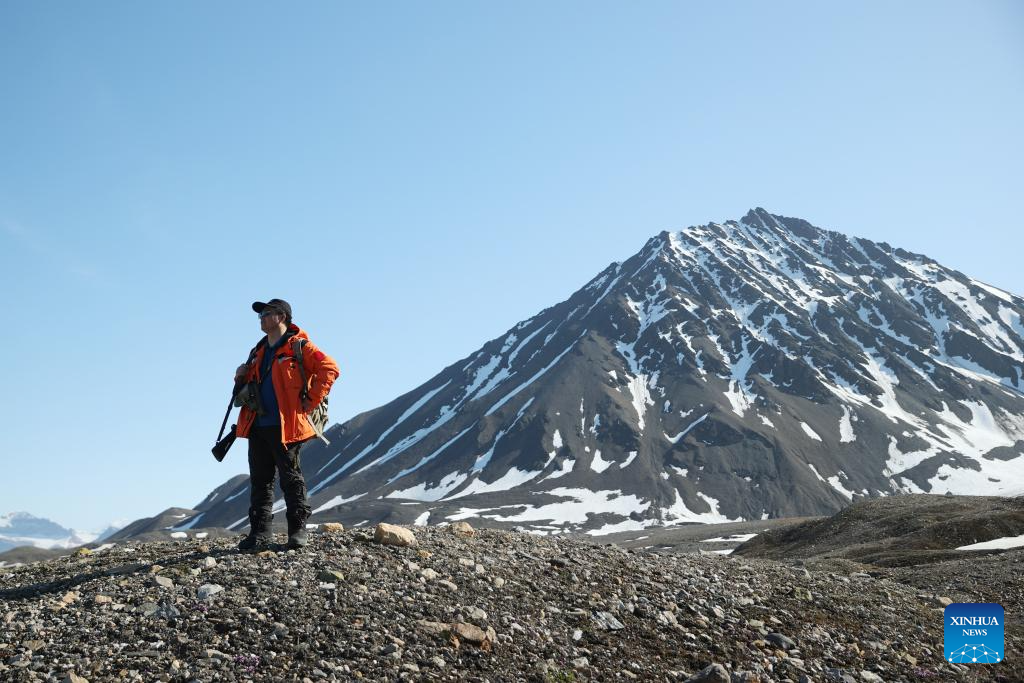
Hu Zhengyi, a member of the Chinese Arctic expedition team, rests on his way to the Austre Lovenbreen glacier in Svalbard, Norway, June 22, 2024.
Based in China's Arctic Yellow River Station, Chinese scientists research on two glaciers in Ny-Alesund of Norway's Arctic Svalbard archipelago to reveal the rate of glacier retreat around the Yellow River Station and its response to global warming, providing an important basis for predicting sea level rise and the impact of climate patterns in the future. (Xinhua/Zhao Dingzhe)
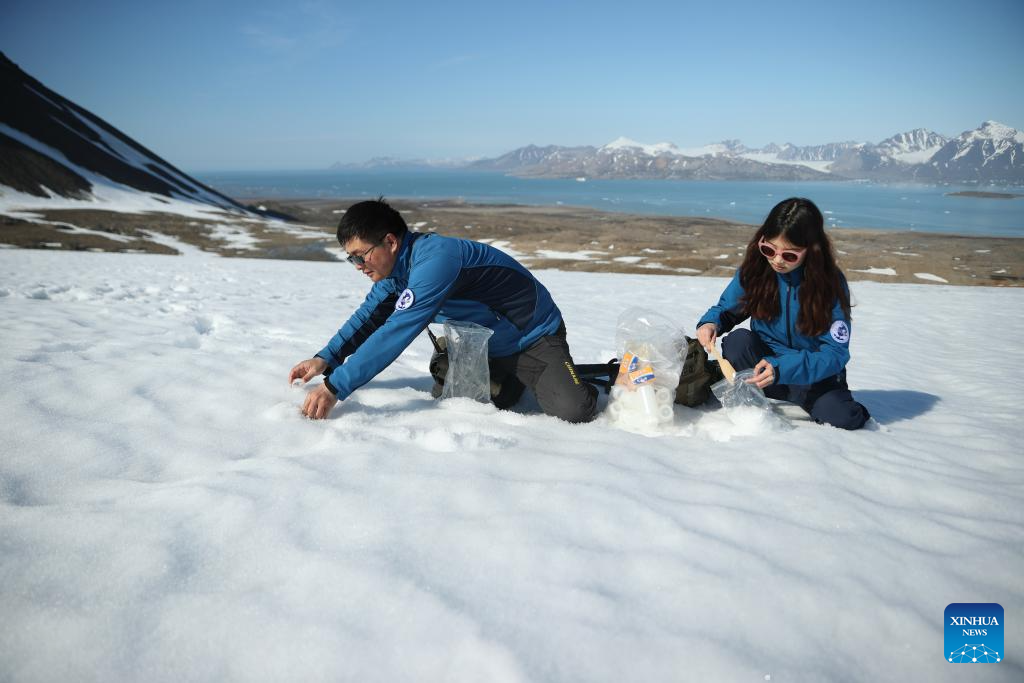
Members of the Chinese Arctic expedition team collect samples on the Austre Lovenbreen glacier in Svalbard, Norway, June 22, 2024.
Based in China's Arctic Yellow River Station, Chinese scientists research on two glaciers in Ny-Alesund of Norway's Arctic Svalbard archipelago to reveal the rate of glacier retreat around the Yellow River Station and its response to global warming, providing an important basis for predicting sea level rise and the impact of climate patterns in the future. (Xinhua/Zhao Dingzhe)
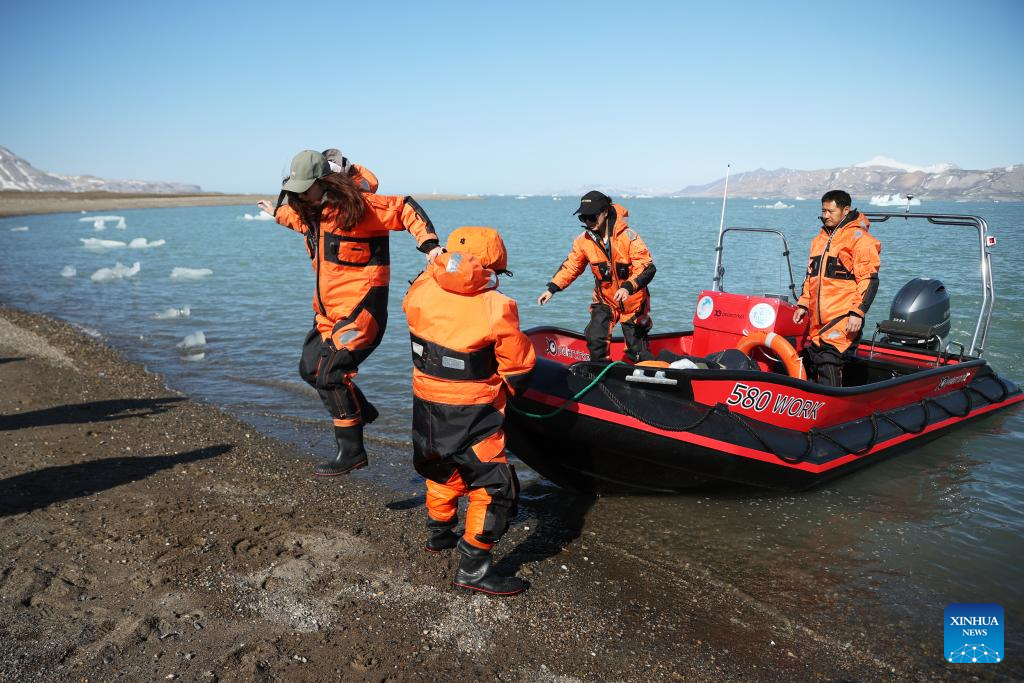
Members of the Chinese Arctic expedition team take a boat out for sampling on the Austre Lovenbreen glacier in Svalbard, Norway, June 22, 2024.
Based in China's Arctic Yellow River Station, Chinese scientists research on two glaciers in Ny-Alesund of Norway's Arctic Svalbard archipelago to reveal the rate of glacier retreat around the Yellow River Station and its response to global warming, providing an important basis for predicting sea level rise and the impact of climate patterns in the future. (Xinhua/Zhao Dingzhe)
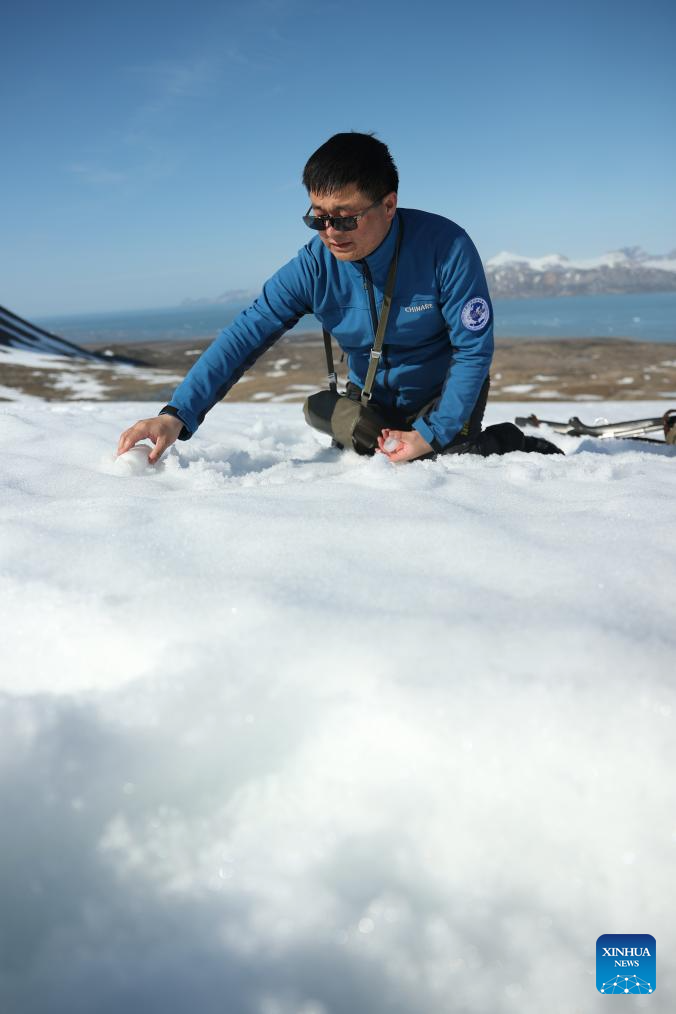
Hu Zhengyi, a member of the Chinese Arctic expedition team, collects samples on the Austre Lovenbreen glacier in Svalbard, Norway, June 22, 2024.
Based in China's Arctic Yellow River Station, Chinese scientists research on two glaciers in Ny-Alesund of Norway's Arctic Svalbard archipelago to reveal the rate of glacier retreat around the Yellow River Station and its response to global warming, providing an important basis for predicting sea level rise and the impact of climate patterns in the future. (Xinhua/Zhao Dingzhe)
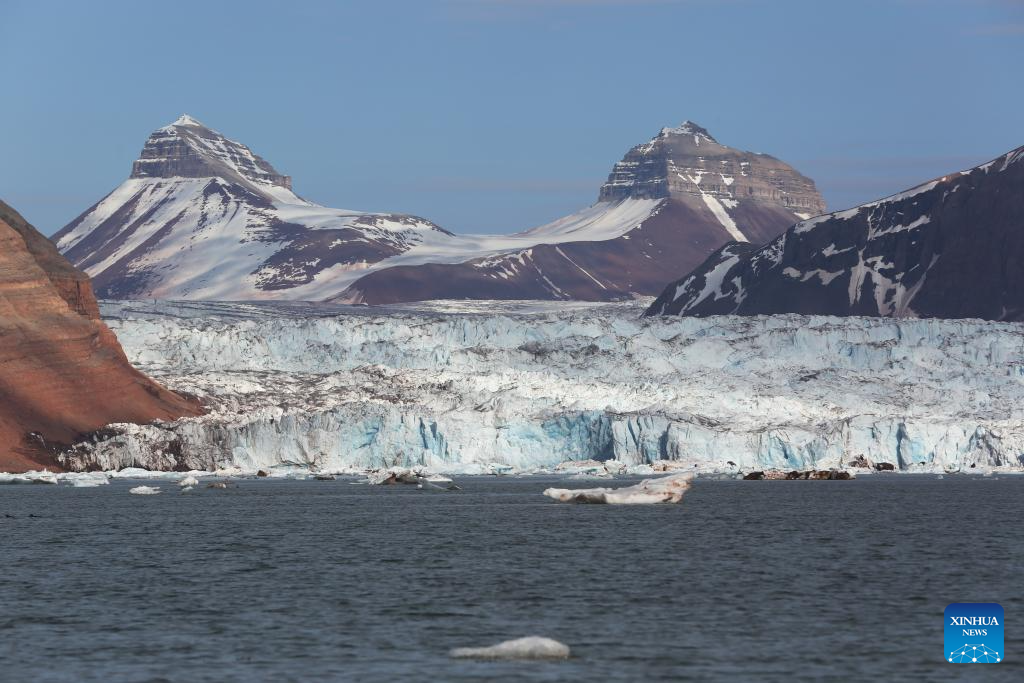
This photo taken on June 22, 2024 shows a view of melting glacier in Svalbard, Norway.
Based in China's Arctic Yellow River Station, Chinese scientists research on two glaciers in Ny-Alesund of Norway's Arctic Svalbard archipelago to reveal the rate of glacier retreat around the Yellow River Station and its response to global warming, providing an important basis for predicting sea level rise and the impact of climate patterns in the future. (Xinhua/Zhao Dingzhe)
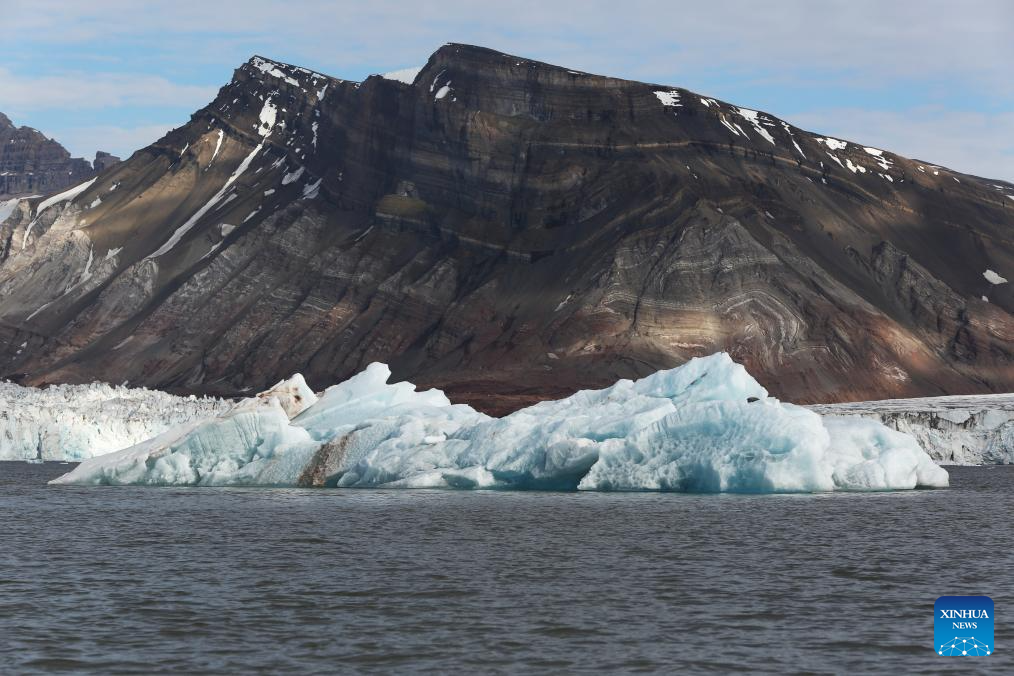
This photo taken on June 22, 2024 shows an iceberg in Svalbard, Norway.
Based in China's Arctic Yellow River Station, Chinese scientists research on two glaciers in Ny-Alesund of Norway's Arctic Svalbard archipelago to reveal the rate of glacier retreat around the Yellow River Station and its response to global warming, providing an important basis for predicting sea level rise and the impact of climate patterns in the future. (Xinhua/Zhao Dingzhe)
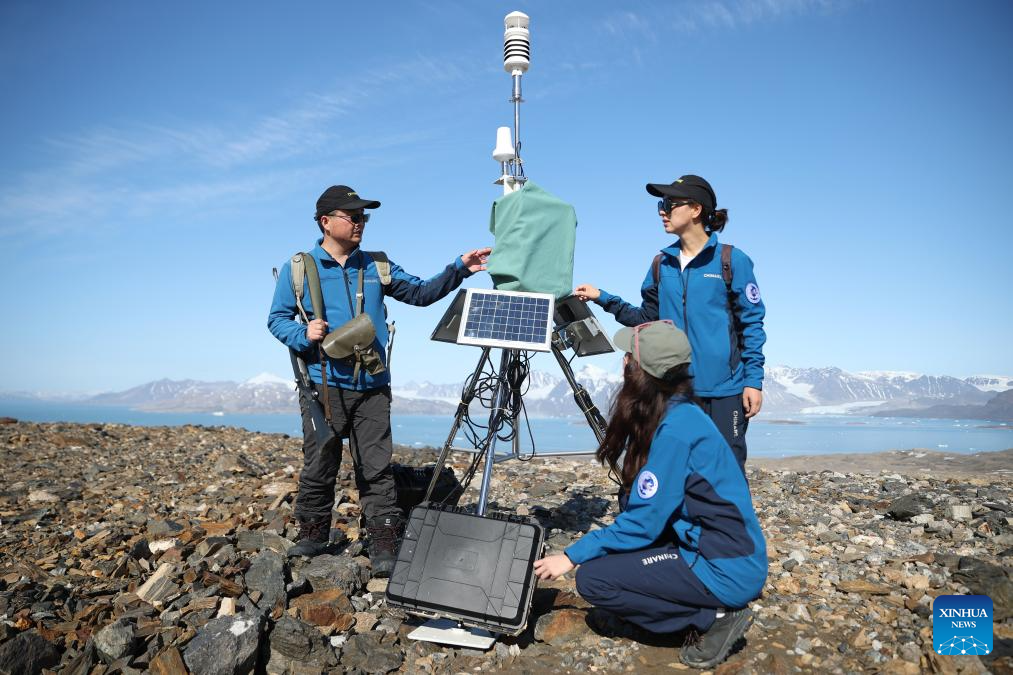
Members of the Chinese Arctic expedition team check the equipment on their way to the Austre Lovenbreen glacier in Svalbard, Norway, June 22, 2024.
Based in China's Arctic Yellow River Station, Chinese scientists research on two glaciers in Ny-Alesund of Norway's Arctic Svalbard archipelago to reveal the rate of glacier retreat around the Yellow River Station and its response to global warming, providing an important basis for predicting sea level rise and the impact of climate patterns in the future. (Xinhua/Zhao Dingzhe)
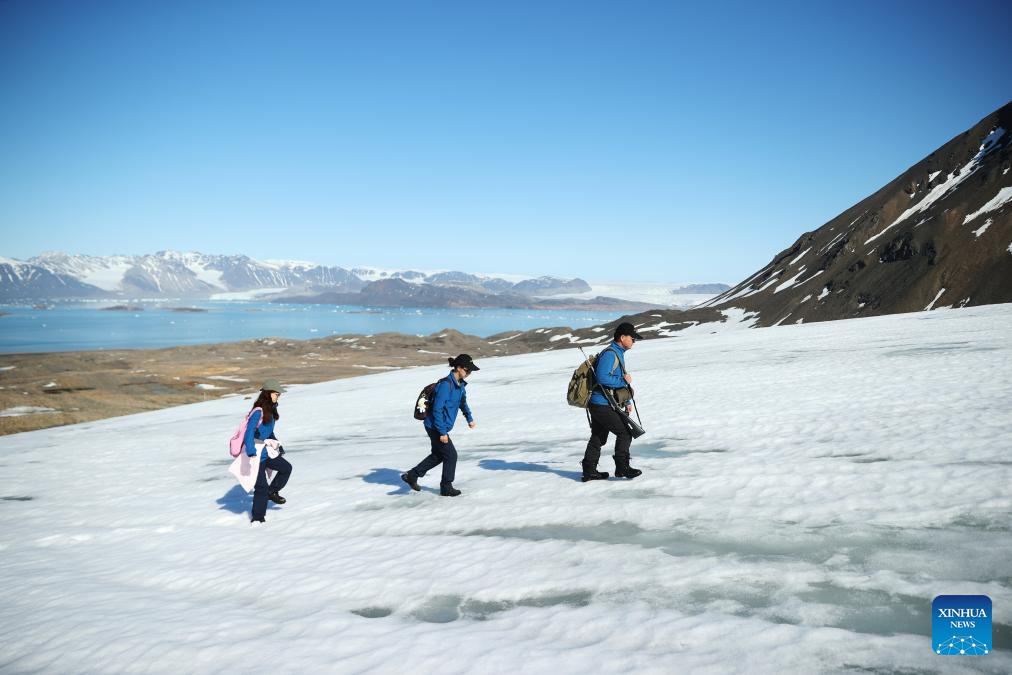
Members of the Chinese Arctic expedition team walk on the Austre Lovenbreen glacier for sampling in Svalbard, Norway, June 22, 2024.
Based in China's Arctic Yellow River Station, Chinese scientists research on two glaciers in Ny-Alesund of Norway's Arctic Svalbard archipelago to reveal the rate of glacier retreat around the Yellow River Station and its response to global warming, providing an important basis for predicting sea level rise and the impact of climate patterns in the future. (Xinhua/Zhao Dingzhe)
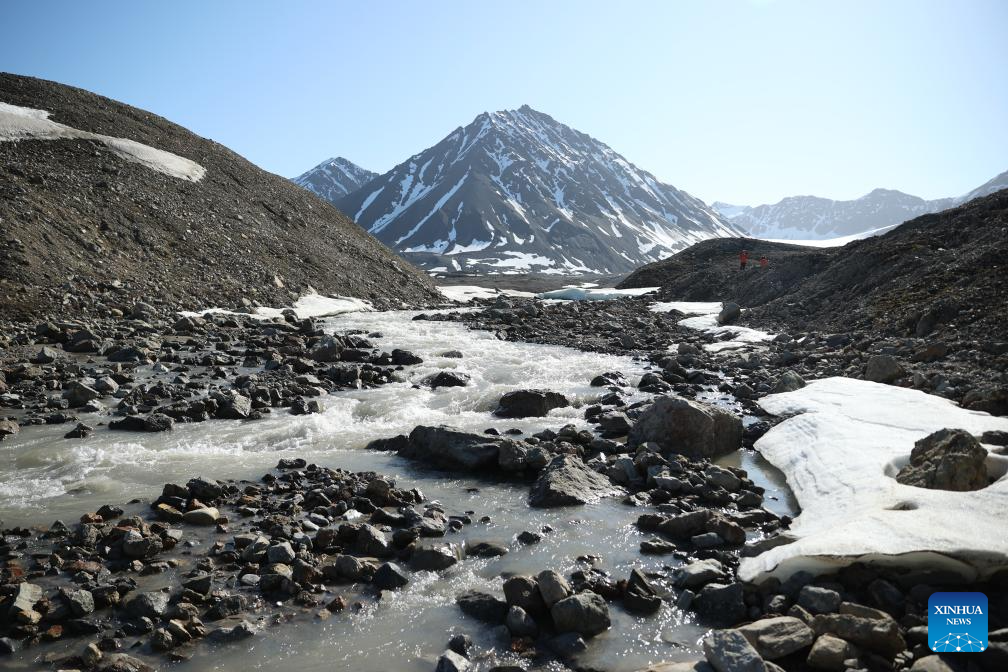
Members of the Chinese Arctic expedition team head for the Austre Lovenbreen glacier in Svalbard, Norway, June 22, 2024.
Based in China's Arctic Yellow River Station, Chinese scientists research on two glaciers in Ny-Alesund of Norway's Arctic Svalbard archipelago to reveal the rate of glacier retreat around the Yellow River Station and its response to global warming, providing an important basis for predicting sea level rise and the impact of climate patterns in the future. (Xinhua/Zhao Dingzhe)
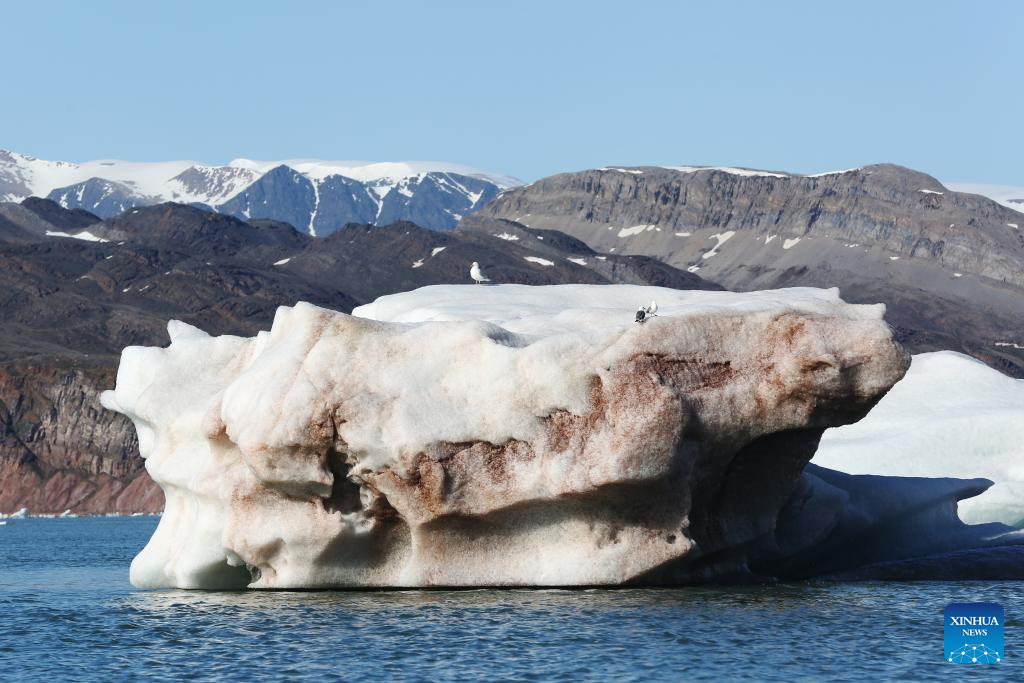
This photo taken on June 22, 2024 shows an iceberg in Svalbard, Norway.
Based in China's Arctic Yellow River Station, Chinese scientists research on two glaciers in Ny-Alesund of Norway's Arctic Svalbard archipelago to reveal the rate of glacier retreat around the Yellow River Station and its response to global warming, providing an important basis for predicting sea level rise and the impact of climate patterns in the future. (Xinhua/Zhao Dingzhe)
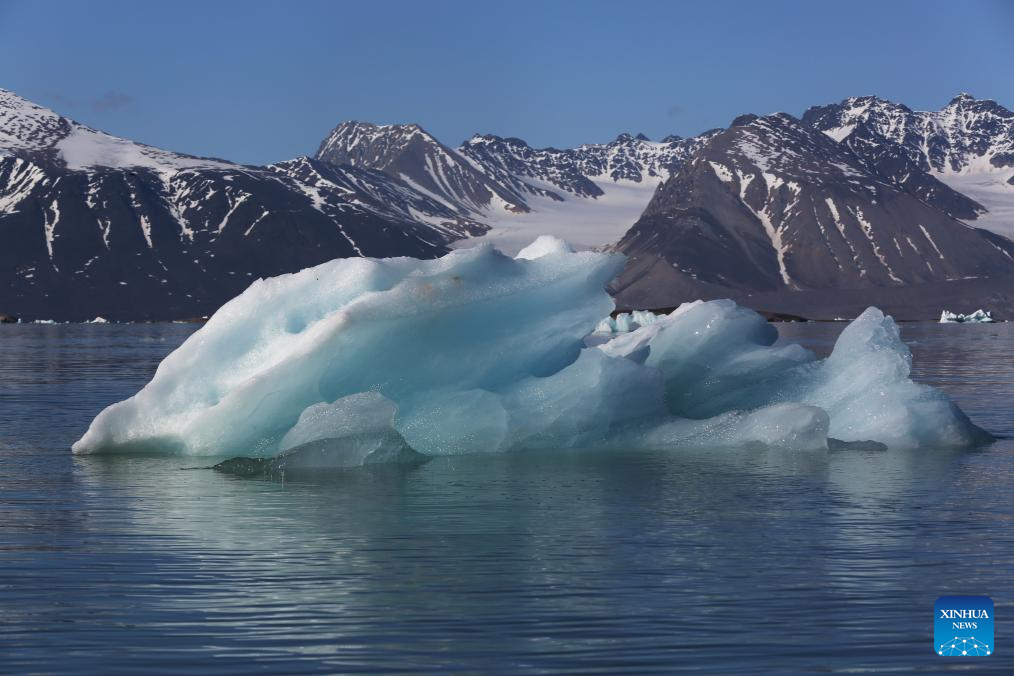
This photo taken on June 22, 2024 shows an iceberg in Svalbard, Norway.
Based in China's Arctic Yellow River Station, Chinese scientists research on two glaciers in Ny-Alesund of Norway's Arctic Svalbard archipelago to reveal the rate of glacier retreat around the Yellow River Station and its response to global warming, providing an important basis for predicting sea level rise and the impact of climate patterns in the future. (Xinhua/Zhao Dingzhe)
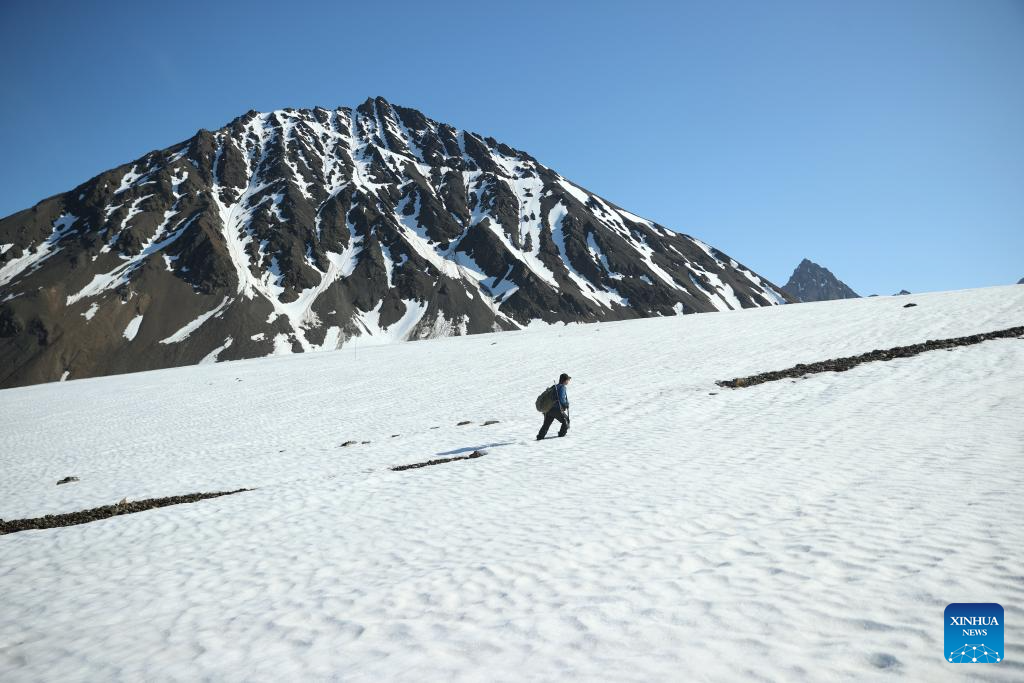
Hu Zhengyi, a member of the Chinese Arctic expedition team, walks on the Austre Lovenbreen glacier for sampling in Svalbard, Norway, June 22, 2024.
Based in China's Arctic Yellow River Station, Chinese scientists research on two glaciers in Ny-Alesund of Norway's Arctic Svalbard archipelago to reveal the rate of glacier retreat around the Yellow River Station and its response to global warming, providing an important basis for predicting sea level rise and the impact of climate patterns in the future. (Xinhua/Zhao Dingzhe)
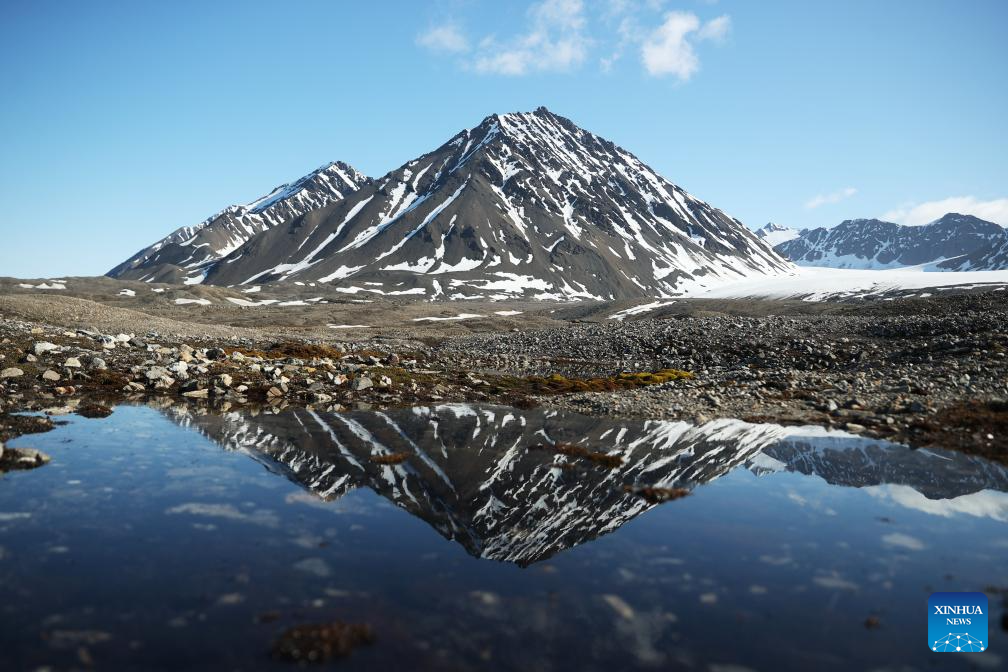
This photo taken on June 22, 2024 shows snow-covered mountains near the Austre Lovenbreen glacier in Svalbard, Norway.
Based in China's Arctic Yellow River Station, Chinese scientists research on two glaciers in Ny-Alesund of Norway's Arctic Svalbard archipelago to reveal the rate of glacier retreat around the Yellow River Station and its response to global warming, providing an important basis for predicting sea level rise and the impact of climate patterns in the future. (Xinhua/Zhao Dingzhe)
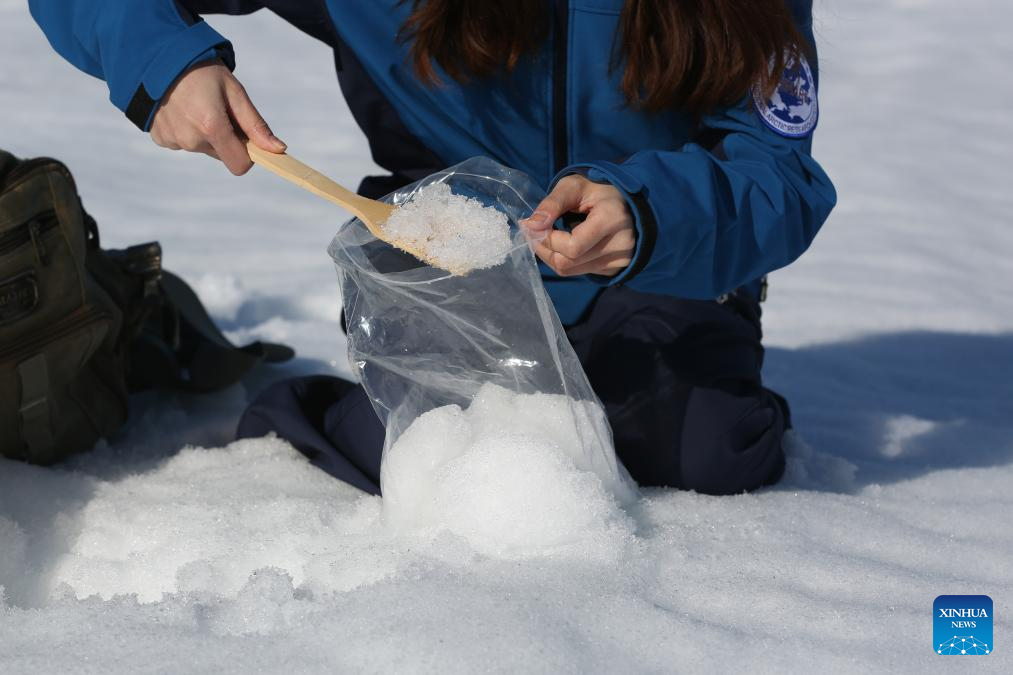
Wu Xiaohan, a member of the Chinese Arctic expedition team, collects samples on the Austre Lovenbreen glacier in Svalbard, Norway, June 22, 2024.
Based in China's Arctic Yellow River Station, Chinese scientists research on two glaciers in Ny-Alesund of Norway's Arctic Svalbard archipelago to reveal the rate of glacier retreat around the Yellow River Station and its response to global warming, providing an important basis for predicting sea level rise and the impact of climate patterns in the future. (Xinhua/Zhao Dingzhe)
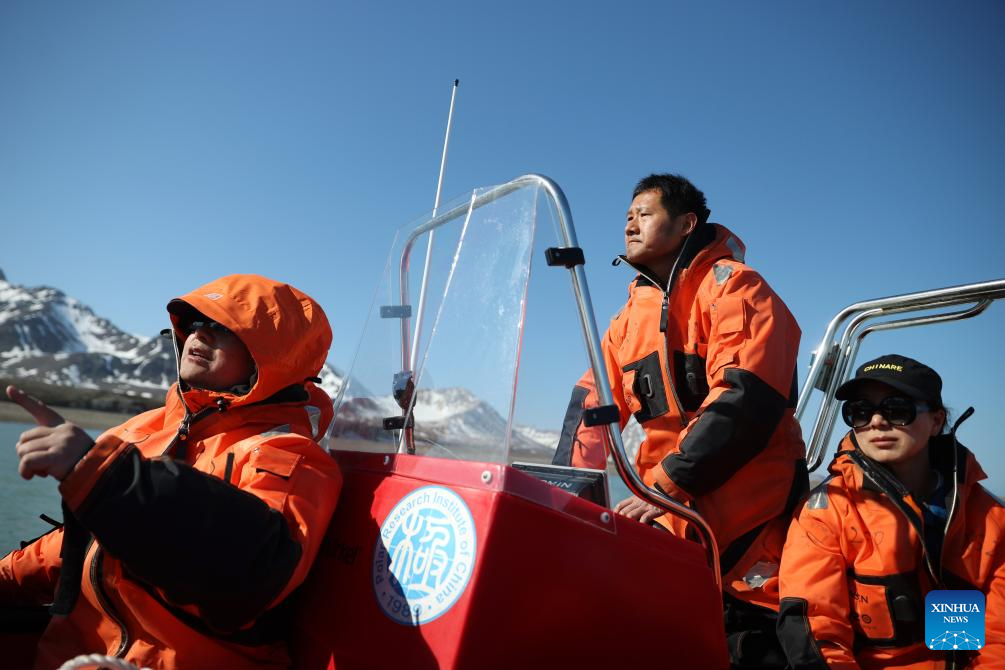
Members of the Chinese Arctic expedition team take a boat out for sampling on the Austre Lovenbreen glacier in Svalbard, Norway, June 22, 2024.
Based in China's Arctic Yellow River Station, Chinese scientists research on two glaciers in Ny-Alesund of Norway's Arctic Svalbard archipelago to reveal the rate of glacier retreat around the Yellow River Station and its response to global warming, providing an important basis for predicting sea level rise and the impact of climate patterns in the future. (Xinhua/Zhao Dingzhe)
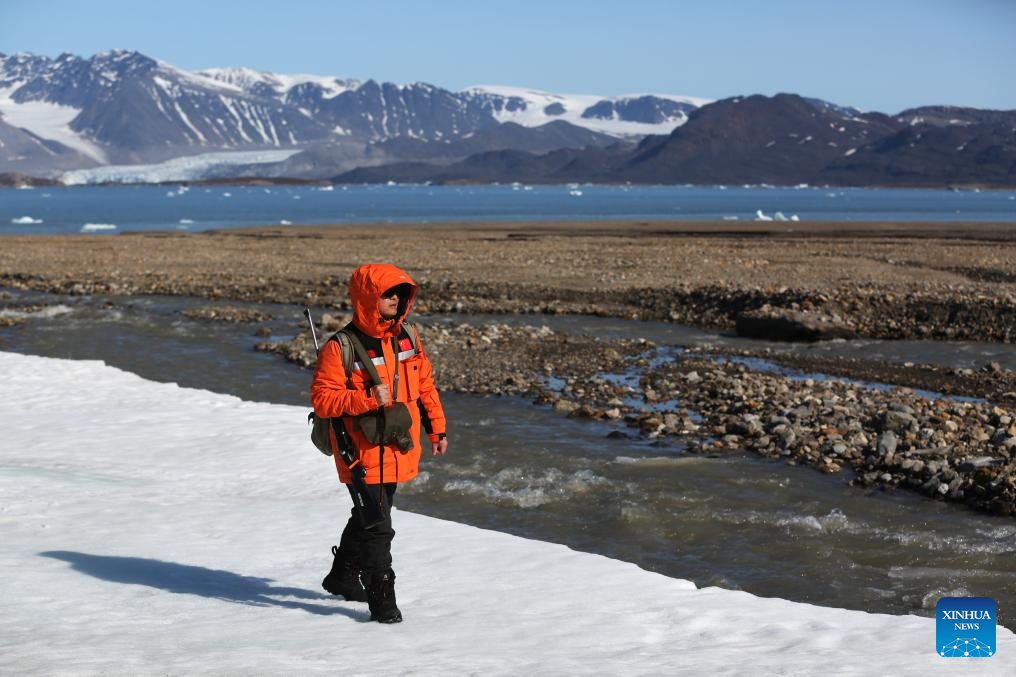
Hu Zhengyi, a member of the Chinese Arctic expedition team, heads for the Austre Lovenbreen glacier in Svalbard, Norway, June 22, 2024.
Based in China's Arctic Yellow River Station, Chinese scientists research on two glaciers in Ny-Alesund of Norway's Arctic Svalbard archipelago to reveal the rate of glacier retreat around the Yellow River Station and its response to global warming, providing an important basis for predicting sea level rise and the impact of climate patterns in the future. (Xinhua/Zhao Dingzhe)



